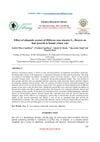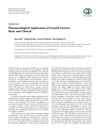 7 citations,
May 2022 in “International Journal of Environmental Research and Public Health”
7 citations,
May 2022 in “International Journal of Environmental Research and Public Health” Isotretinoin therapy for acne can cause many reversible side effects, mainly mild skin conditions, and patient understanding of these effects can improve treatment adherence.
 5 citations,
December 2021 in “Frontiers in Cell and Developmental Biology”
5 citations,
December 2021 in “Frontiers in Cell and Developmental Biology” Enzymes called PADIs play a key role in hair growth and loss.
 4 citations,
October 2022 in “Genes”
4 citations,
October 2022 in “Genes” Our microbiome may affect the development of the hair loss condition Alopecia Areata, but more research is needed to understand this relationship.
 4 citations,
May 2012 in “Journal of Investigative Dermatology”
4 citations,
May 2012 in “Journal of Investigative Dermatology” The symposium concluded that a specific lipid might cause hair loss, inflammation is a key factor, and stem cells in bald scalps aren't working right, suggesting new treatment targets.
 3 citations,
October 2023 in “Military Medical Research/Military medical research”
3 citations,
October 2023 in “Military Medical Research/Military medical research” Regulatory T cells help heal skin and grow hair, and their absence can lead to healing issues and hair loss.
 2 citations,
November 2022 in “BioMed Research International”
2 citations,
November 2022 in “BioMed Research International” Baicalin may help treat hair loss by promoting hair follicle growth and activating specific cellular pathways.
1 citations,
December 2023 in “Biomolecules” Regulating cell death in hair follicles can help prevent hair loss and promote hair growth.
 August 2024 in “Journal of Clinical Medicine”
August 2024 in “Journal of Clinical Medicine” Pruritus is common in LPP and FFA, worsened by heat and stress, and relieved by cold, affecting quality of life.
April 2024 in “Journal of clinical medicine” Recognizing specific skin features helps diagnose and manage lupus erythematosus effectively.

Different stem cells are key for hair growth and health, and understanding their regulation could help treat hair loss.
 November 2023 in “Current Dermatology Reports”
November 2023 in “Current Dermatology Reports” Oral minoxidil is effective for various hair loss types and may improve male sexual function, but aspirin can reduce its effectiveness.
 June 2023 in “Plastic and Reconstructive Surgery – Global Open”
June 2023 in “Plastic and Reconstructive Surgery – Global Open” Exosomes may improve skin, scars, hair growth, and fat grafts in plastic surgery, but more research is needed.
 January 2023 in “Karger Kompass. Dermatologie”
January 2023 in “Karger Kompass. Dermatologie” Scientists are still unsure what triggers the immune system to attack hair follicles in Alopecia areata.
 December 2022 in “Dermatology and Therapy”
December 2022 in “Dermatology and Therapy” Alopecia areata needs more recognition and better treatment access in Latin America to improve patient care and outcomes.
December 2022 in “IntechOpen eBooks” 308 excimer phototherapy is a safe and effective way to treat hair loss from Alopecia Areata.
 January 2017 in “Journal of Investigative Dermatology Symposium Proceedings”
January 2017 in “Journal of Investigative Dermatology Symposium Proceedings” The 2015 Hair Research Congress concluded that stem cells, maraviroc, and simvastatin could potentially treat Alopecia Areata, topical minoxidil, finasteride, and steroids could treat Frontal Fibrosing Alopecia, and PTGDR2 antagonists could also treat alopecia. They also found that low-level light therapy could help with hair loss, a robotic device could assist in hair extraction, and nutrition could aid hair growth. They suggested that Alopecia Areata is an inflammatory disorder, not a single disease, indicating a need for personalized treatments.
May 2023 in “Journal of Cosmetic Dermatology” Androgenetic alopecia is linked to higher cardiovascular and metabolic risks, possibly due to irisin resistance.
January 2022 in “Springer eBooks” 9 citations,
July 2021 in “Journal of Medicinal Food” Lactobacillus paracasei HY7015 helps hair grow in mice.
 2 citations,
June 2016 in “Korean journal of veterinary research”
2 citations,
June 2016 in “Korean journal of veterinary research” Emodin may help hair grow similarly to minoxidil and could treat baldness.
 January 2023 in “Voennaâ medicina”
January 2023 in “Voennaâ medicina” Hair loss in women can improve with iron and vitamin supplements if caused by iron deficiency.
 3 citations,
April 2014 in “Journal of Dietary Supplements”
3 citations,
April 2014 in “Journal of Dietary Supplements” CARI ONE helps start hair growth and makes hair follicles bigger and more numerous.
 22 citations,
October 2019 in “International Journal of Nanomedicine”
22 citations,
October 2019 in “International Journal of Nanomedicine” The nanoparticles improved hair growth and enlarged hair bulbs.
 9 citations,
March 2015 in “Journal of Microbiology and Biotechnology”
9 citations,
March 2015 in “Journal of Microbiology and Biotechnology” Ultra-high molecular weight poly-γ-glutamic acid may help promote hair growth.
 4 citations,
January 2011 in “Der Pharmacia Lettre”
4 citations,
January 2011 in “Der Pharmacia Lettre” Hibiscus flower extract slowed down hair growth in rats.
 2 citations,
January 2015 in “BioMed Research International”
2 citations,
January 2015 in “BioMed Research International” Growth factor treatments are increasingly used in medicine but require more research to fully understand their mechanisms.
 December 2022 in “Deleted Journal”
December 2022 in “Deleted Journal” Sheep wool keratin solution safely and effectively promotes hair growth.
 September 2021 in “CRC Press eBooks”
September 2021 in “CRC Press eBooks” Alopecia areata incognita causes sudden hair thinning, responds well to steroids, and is more common in those with genetic hair loss conditions.
October 2019 in “DOAJ (DOAJ: Directory of Open Access Journals)” The nanoparticles effectively deliver herbal extract to enhance hair growth.
June 2016 in “Indian Journal of Pharmacy Practice” Stopping fluvoxamine can reverse hair loss caused by the drug.





















